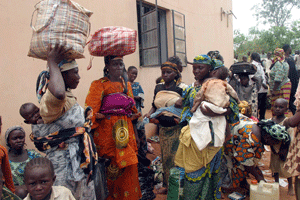Even though the U.S. Commission on International Religious Freedom named Nigeria a “country of particular concern” on May 1, Catholic Archbishop John Olorunfemi Onaiyekan of Abuja, has said that the so-called religious violence between Muslims and Christians in Nigeria is not, in fact, about religion—a view that has been endorsed by the Sultan of Sokoto, one of Nigeria’s leading Muslims. These “are matters between groups with special interests,” the archbishop said during a meeting with members of the commission. Archbishop Onaiyekan attributed the conflicts to the corruption of politicians. Nigeria is an example of how opinions about religious freedom in a country can differ widely between international activists and a country’s native clergy. According to the commission, a country is designated as a country of concern when its government has “engaged in or tolerated systematic and egregious violations of the universal right to freedom of religion or belief.”
Causes of Nigerian Violence Debated
Show Comments (
)
Comments are automatically closed two weeks after an article's initial publication. See our comments policy for more.
The latest from america
At a Mass for the Jubilee of Youth outside Rome, Pope Leo exhorted over a million young people to be "seeds of hope" and a "sign that a different world is possible."
Perhaps it is the hard-won wisdom that comes with age, but the Catholic rituals and practices I once scorned are the same rituals and practices that now usher me into God's presence, time and time again.
"Only through patient and inclusive dialogue" can "a just and lasting conflict resolution can be achieved" in the long-running conflict between Israelis and Palestinians, said the Holy See's permanent observer to the United Nations.
The ”Bad Guys” films ask, how do we determine who the “bad guys” are? And if you’re marked as “bad” from the start, can you ever make good?








